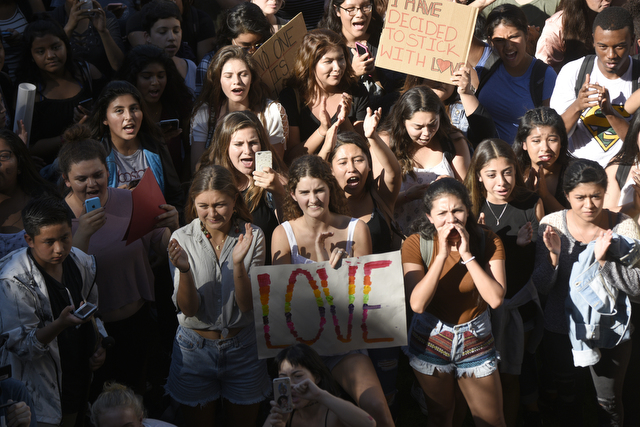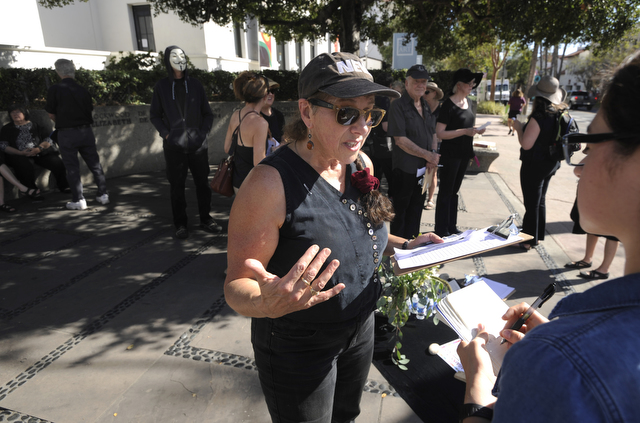Political Agitation Roils the Electorate
Protests, Silent Vigils, and Petitions Mark the Post-Election Week

Public displays of dismay and agitation with the national election result continue in Santa Barbara, with members of Santa Barbara in Black resuming their Friday noon vigil at the corner of State and Anapamu streets. A march is being organized by PODER for Saturday, starting at De la Guerra at 1 p.m., after the Veterans Parade has rolled down State Street at noon. The protesters join hundreds of student activists at Santa Barbara, San Marcos, and Dos Pueblos high schools, and at UCSB who rallied Wednesday both in protest of the election and of Trump’s racist and misogynistic statements.
Santa Barbara in Black, a group formed after 9/11 to advocate for peace and nonviolence by a mixture of Quakers and Buddhists, plans to stand silently from noon to 1 p.m. until the inauguration. The group supports nonviolent action to challenge the injustices Trump is expected inflict on women, people of color, Muslims, and immigrant communities. By acting as a clearinghouse for Santa Barbara groups, they intend to work toward asylum for Syrian refugees, immigration reform, and help and homes for the homeless.

In expectation of the struggles ahead for “people of color, women, LGBTQ people, Muslims, undocumented people, and disabled people,” PODER will march for unity and “dignity and respect.” Organizers changed the time of the United Against Hate action once they learned of the Vets Day parade, recognizing the myriad people who serve in the military. Their concerns include hate crimes, which they state have been exacerbated by Trump’s campaign, and sexual assault, of which Trump has been accused.
As news of Trump’s transition team makeup leaked out, California Secretary of State Alex Padilla issued a scathing press release regarding Kris Kobach, his counterpart in Kansas, calling his appointment on immigration “a deeply troubling message that telegraphs an imminent assault on our collective voting rights and civil rights. His participation is a threat to diverse communities throughout our nation,” Padilla wrote. “Kobach’s pattern of supporting racist, anti-immigrant policies including voter suppression and racial profiling laws … are not only divisive but have repeatedly been found unconstitutional.” Padilla described Kobach as the author of Arizona’s failed law that would have allowed police officers to demand proof of citizenship and as a former employee at the Federation for American Immigration Reform, or FAIR, called a “hate group” by the Southern Poverty Law Center in 2007.
In a piece partially titled “Now They’re on His Transition Team,” the New York Times identified a long list of lobbyists, their clients, and stances on energy, telecommunications, economics, transportation, and steel, and their new affiliated roles picking people to fill positions in Trump’s administration. While campaigning, Trump had promised to “drain the swamp” and ban government officials from lobbying for five years.
The “energy independence” position went to Michael Catanzaro, the Times identified, whose client list includes Devon Energy and Encana Oil and Gas, and who challenged the Obama administration to increase methane gas release at drilling sites and the export of crude oil. He’s joined by Mike Ference of lobbyists S-3 Group, whose clients include Halliburton and Koch Industries, POLITICO wrote. Jeffrey Eisenach, a telecomm consultant who helped corporations fight FCC regulation and net neutrality, will now “rebuild the staff at the FCC,” reported the Times.
In an interesting juxtaposition of Internet use and the logistics of information about national candidates during the Founding Fathers’ time — hence the establishment of a smaller, representative electoral college as a hedge against, for instance, suggests Snopes, a “charismatic tyrant” from a highly populated state against slavery — Change.org posted an against-all-odds attempt to petition Electoral College electors to change their vote to Hillary Clinton, despite their pledge to individual candidates. Started Wednesday morning, the petition had more than 3 million signatures by Friday afternoon. More than 120 million votes were cast for president on Tuesday. Though Donald Trump had most Electoral College votes with 290 — compared to Hillary Clinton’s 228 — Clinton’s portion of the popular vote was greater than Trump’s by more than 570,000 votes as of Saturday. Among the 50 states, 26 align their electors with the state’s popular vote by law. Some face monetary sanctions for switching their vote – and are simply replaced by an alternate elector – but the political alienation these “faithless” party insiders would face has long been considered deterrence enough.


